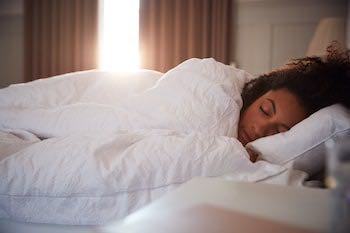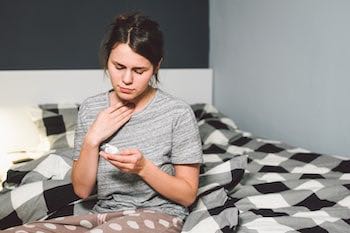Correlation Between Your Sleep And Immune System
Are you wondering about the connection between sleep and immune system function? Amid the COVID-19 pandemic, people are trying anything and everything to boost their immune systems to stay healthy. Ginger root, a powerful antioxidant, is flying off the shelves. People are downing concoctions made of green tea and cayenne pepper.
But your best bet to stay healthy—other than following established safety guidelines like hand washing and social distancing—likely isn’t a new-age remedy. It’s consistently getting a good night’s sleep. That’s because of the robust correlation between the quality of sleep and immune system function.
Here’s what you need to know.
The Close Link Between Sleep and Immune System Function
Sleep deficiency can lead to all sorts of obvious short-term problems, like difficulty concentrating, forgetting things, irritability, and stress. But thanks to the close connection between the quality of sleep and immune system function, it can also lead to serious health consequences—and that’s especially true during a pandemic.
Studies have shown that people who don’t get quality sleep or don’t get enough sleep are more likely to become ill after being exposed to a virus, whether it’s the common cold or a severe respiratory illness like COVID-19.
The correlation between good sleep and immune system function has to do with little proteins released by the immune system while you’re sleeping called cytokines. Not only do cytokines help you stay asleep, but they also help you fight infections and inflammation. When your body is under attack by a virus, your body needs to be able to produce these protective cytokines in huge numbers.
People who are sleep deprived can’t produce cytokines like they should be able to, which means they are more susceptible to contracting an illness whenever exposed to a virus. To make matters worse, the body’s production of antibodies and infection-fighting cells decreases during periods of poor sleep.
Now that you know the connection between sleep and immune system function, we’ll walk you through the basics of getting a good night’s sleep.
How Much Sleep Do You Need?
How much sleep do you need to bolster your immune system? The answer to this question is different for everyone, but we can tell a lot based on your age.
The ideal amount of sleep for most adults is between seven and eight hours. Mind you, this is good sleep, not sleep interrupted by bathroom breaks and tossing and turning. Keep in mind that more rest does not always mean better sleep. Many adults that sleep more than nine hours suffer from poor quality sleep.
Teenagers need more sleep than adults, generally between nine and 10 hours. Young children need ten or more hours of sleep.
A Guide to Sleeping Well
Now that you have an idea of how much sleep you should be getting to keep your immune system running strong, here are some good habits to ensure you get the quality of sleep you need.
Keep in mind that, on average, falling asleep should take between 10 and 15 minutes. If you find yourself falling asleep within a few minutes but then struggle to stay asleep, you may be sleep-deprived.
First, you want to avoid alcohol, especially close to bedtime. We admit that this may be a tall order during a pandemic when there’s not much else to do, but if you’re having trouble sleeping, try cutting alcohol out altogether and see if it makes a difference. Caffeine and tobacco, both of which are stimulants, can also cause sleep problems.
Irregular bedtimes can lead to highly variable sleep quantity and quality. Try to create a bedtime routine and stick to it. Keep the temperature of your room cool, 68 degrees or less. Eating and watching TV before bed can also cause sleep interruptions. Try to avoid eating heavy foods before bed and minimize “screen time” before bed.
Your Bed Matters
Another vitally important factor that will impact your ability to sleep and the immune system? Your bed, of course. If you’ve noticed that you’re not sleeping as well as you used to, it may be time to invest in a new mattress.
If you have grown accustomed to not sleeping well, it may be challenging to know whether or not you need a new mattress. Here are some common signs you need a new bed:
– Your mattress is over eight years old
– You don’t feel rested when you wake up
– You develop mysterious aches and pains
– The mattress is sagging
SleepWorld Mattress Store has been helping the Edmond, and the OKC area sleep more soundly since 1953. We have mattress specialists on staff that can help guide you to the perfect mattress. We even create our mattresses, bases & frames, pillows, and other accessories under the SleepWorld brand in a warehouse that’s attached to our showroom.
Give us a call at (405)-341-2423 to take advantage of our 30-day comfort guarantee.
SleepWorld Mattress Store, offers handcrafted mattresses as well as bases & frames, pillows, and other accessories. SleepWorld is the best source for custom size mattresses for your boat, RV, or antique frame! We have served the people of the Edmond and OKC area since 1953. Feel free to stop by and check out our showroom with quality mattress brands like Symbol and Englander! Call us today at (405)-341-2423 and learn about our 30 day comfort guarantee.



